- Home
- Jim Kjelgaard
The Lost Wagon Page 10
The Lost Wagon Read online
Page 10
CHAPTER TEN
Snedeker's
The tower family, Joe thought with a smile, had never been as well offas it was right now. Baby Emma had come through her illness, and wasthriving. They hadn't been assigned an orderly, but most of the timeamong the soldiers who were off duty, they had from four to fifteen.Joe's smile widened and his eyes sparkled. Some of the officers andnoncoms had their wives with them and some of the enlisted men hadsquaws to whom, Joe presumed, they were married.
But Laramie was an isolated fort. Most of the soldiers were young, outfor a taste of adventure, and they found little enough. Even patrolsinto Indian country became monotonous after one made a sufficient numberof them, and winter duty at the fort was routine.
Bringing Barbara among so many lonely youngsters who hadn't expected tosee a girl until emigrant trains started coming through in the springcreated a situation which had all the explosive potentialities of amatch held too near an open powder keg and was, at the same time,amusing.
Wood was the fuel used at Laramie, but Joe hadn't had to cut or carryany. The wood box was always filled, and at least five times a day someyoungster who had elected to wear his country's uniform dropped in tosee if the Towers didn't need any more. The water pails invariablybrimmed over, and they were always full because the men of Laramie haddecided that nothing but the freshest water was good enough. WhenBarbara went to the sutler's store, she was always attended by an escortlarge enough to form a good-sized patrol and she could not carry eventhe smallest parcel back. Every evening, until Emma shooed them out,their quarters overflowed with soldiers eager to do anything at all aslong as they could be near Barbara.
Joe did not worry about her; any soldier who offered an insolent remark,or even an insolent look, to Barbara, would have been overwhelmed by asufficient number of her protectors. But, aside from the fact that Joewanted to winter at Snedeker's and not at Laramie, the affair had itsmore serious aspects. Only last night Privates Haggerty and Jankoski,vying for the honor of walking closest to Barbara when she went to thestore, had left each other with blackened eyes and bleeding noses andthey'd promptly been clapped into the guardhouse for their pains.Probably there would be other fights; Joe understood that Private Browndid not gaze with a kindly eye on Corporal Lester. Lester had filled thewater pails just as Brown was on his way to do it.
Joe chuckled out loud. Sitting across the breakfast table from him, Emmaraised an inquiring eye.
"I was thinking of those two crazy kids, Haggerty and Jankoski, and thefight they had over Bobby last night," he explained.
"Sh-h." Emma nodded toward the bedroom in which Barbara still slept."She'll hear you."
Joe lowered his voice. "I didn't mean to talk so loud. It looks to me,if we don't get Bobby out of here, as though the Army will be at warwith itself."
"Yes, dear," Emma smiled abstractedly and Joe saw that her mind waselsewhere. He leaned back in his chair, looking idly at his empty plate.Then he rose to get his coat.
"Are you going out?" Emma asked.
"Yes. I'm getting the wagon back into shape."
Emma asked casually, "Joe, do you know anything about this young man,Hugo Gearey?"
Joe shrugged. "I've seen him around."
"But you don't know where he came from?"
He was a little surprised. "Why should I?"
"Can you find out?"
"Now look, I can't just walk up to Gearey and ask him where he comesfrom and what he did there."
"You might," she pointed out, "ask Sergeant Dugan or Sergeant Dunbar."
He looked closely at her. "Why do you want to know about Gearey, Emma?"
She avoided his eyes. "Just a woman's curiosity. Will you find out?"
He said reluctantly, "I'll ask Dugan or Dunbar."
Joe left, and Emma sat alone at the table. After such a long time on theTrail, the past three days at Laramie had been unbelievable luxury.Their quarters were warm and snug, with adequate housekeepingfacilities. The roof was wood instead of canvas. Best of all, there hadbeen three days of blessed relief from worry and tension. For the firsttime since leaving Independence Emma slept restfully because she waspositive that they would have to respond to no alarm in the middle ofthe night. Because they did not have to rise with the sun and travel allday, there was leisure for sewing, washing, and preparing meals as Emmathought they should be prepared. However, though Laramie providedsurcease from the rigors of the Trail, it brought its own problems.
Emma did not agree with Joe's notion that there was no reason to worryabout Barbara. Most of the young men who overwhelmed her with attentionwere more amusing than otherwise. Except that some of them were a littleolder than the swains who had so awkwardly wooed Barbara in Missouri,they did not differ greatly from the Tenney's Crossing youths. Theyblushed easily, sometimes stumbled over their own feet, and while theydevoted themselves to Barbara and wanted to admire, they were content todo so from a distance. Barbara could wither them with a frown, or sendthem into ecstasy with a smile. Emma poured a second cup of coffee, ablissful extravagance, and thought about Private Hugo Gearey.
Emma thought he was about twenty-six, not old, but still older than mostof the other privates. There was about him a fine courtliness andcourtesy which within itself spoke of background and good breeding; heknew exactly what to say and exactly when and how to say it. His was acharm that attracted men and captivated women. Emma had never before metsuch a person, and she knew that all of Gearey's charm and courtlinesshad been fully noticed by Barbara.
But though Emma was old enough, and wise enough, to base her finalappraisal of anyone at all on other than outward characteristics, shecould not suppress an uncomfortable feeling that Gearey's eyes were coldand that they betrayed an inner weakness. Most of all, with no war on,she wondered what a person of his obvious breeding and background wasdoing, as a private, in a fort like Laramie. She conceded that he mightbe out for a bit of adventure, but most of the youngsters who were atLaramie for that reason alone were from three to seven years youngerthan Gearey. Though there were a few older privates who kept their owncounsel and doubtless had their own reasons for being where they were,most of the enlistees who were making the Army a career werenon-commissioned officers by the time they were Gearey's age.
The bedroom door opened and Barbara appeared, sleep-disheveled butlovely.
"Good morning, Mother."
"Good morning, dear. Did you sleep well?"
"Oh!" Barbara stretched her young arms for the sheer pleasure of doingso. "I had a heavenly rest!"
"I'll get your breakfast."
"I'll get it, Mother."
Barbara washed, put two slices of bacon in a skillet and knelt beforethe fire place. She broke an egg over the sputtering bacon, brought itto the table and buttered herself a piece of bread. Emma smiled at herdaughter.
"Have you reflected upon your ardent suitors' fist-fight of last night?"
Barbara said scornfully, "Yes, and it was so silly! I couldn't stopthem, and I was just mortified when they insisted on fighting that way!"Her face clouded. "Do you think they'll keep them in the guardhouse verylong, Mother?"
"I suppose they'll be out before they're both old men." Barbara grinned,and said happily, "It's been such fun!" "It would be," Emma admitteddryly, "with fifty or more unattached young men ready to grovel at yourfeet every time you make calf's eyes at them."
She laughed, "Oh Mother, none of them are serious--it's really all fun!"
"I don't know about that. How many proposals have you had?"
"Only seven so far. Johnny Parr, Michael Dilling, and Pete Robbins wantto come to Oregon just as soon as their enlistments are up. AlbertJohnson asked me to go to Baltimore with him, after we're married ofcourse! His father has a store there, and I can be a clerk in it. RodneyBurr, he's from Maine and he talks so strangely, has wonderful plans forstarting a shipyard in San Francisco. Robert Smith and Dan Jankoski wantto get married right here."
"What did you tell them?"
"Mother,
what _would_ I tell them? I don't want to marry any of them."
"I hope you didn't hurt their feelings."
"I refused as nicely as I could."
Emma looked down at the table, gratified. Barbara was no longer thehalf-child half-woman who had left Missouri. The Oregon Trail had givenher a new maturity and poise. Barbara finished her meal and folded herhands thoughtfully under her chin. She stared across the table and for amoment she did not speak. Then,
"Mother, there's a dance tonight in the mess hall. May I go?"
"Do you mean you can single out just one escort?"
"Hugo asked me," she said dreamily. "He--he's so different. I--I justcan't explain it. He simply makes the others seem like children. Hishome is in New York City, and it will take me at least a year to tellyou all the things he's told me about it."
Emma murmured, "Hugo must talk fast."
"He does, Mother!" she said eagerly, missing entirely the double meaningin Emma's remark. "He's the most interesting young man I've ever met!"
Because she knew she dared say nothing else, Emma said, "Yes, dear, youmay go."
"Thank you, Mother."
Though Emma would not have left her youngest children alone on theprairie, she felt safe to leave them in Tad's care at the fort. Thatnight, to the music of a very good five piece band, she danced in Joe'sarms. She waited for him to tell her anything he might have found outconcerning Hugo Gearey, and when he said nothing she knew that he hadforgotten to ask. In turn Emma danced with Sergeants Dugan, Dunbar, anda variety of others. She watched the young men trying desperately todance with Barbara.
Emma noted that she was with Hugo Gearey for two dances out of three.She did, then, want to dance with him. Soldiers watched the pair,jealous and suspicious. Emma danced again with Joe, and she knew that hewas very tired. She smiled at him, clasped his hand a little moretightly and glanced again at Barbara.
"We can go," she whispered. "The dance is finished in another fifteenminutes anyhow."
"Wouldn't you like to see it out?"
"No, darling."
Back in their quarters, Joe stifled a yawn and washed up. Emma sat atthe table, glancing alternately at the flickering oil lamp and at herhusband.
"I'm really not tired. I'll wait for Barbara."
Emma resisted an impulse to go to the window and look out. She knew thedance was over, but Barbara had not appeared. Then, a half hour later,she heard them at the door. Emma waited, not sure as to whether or notshe was doing right. She tried not to listen to their low-pitchedvoices. But there could be no mistaking the sharp sound of someone'sface being slapped.
The door opened and Barbara rushed in. Her cheeks were red, her eyeswere furious. She saw her mother and stopped uncertainly, closing thedoor behind her.
"Mother!"
She wilted into Emma's arms and muffled her heartbroken sobs. Emma heldher strongly and caressed her tenderly. Barbara drew back and plastereda handkerchief to her face.
"Oh, Mother," she sobbed. "I thought he was so wonderful! He's horrible,Mother, _horrible_! The things he said! And then he tried to--to--"There was a fresh burst of sobbing.
"Thank God you found out," Emma said quietly. "I've been afraid of thatyoung man from the beginning. But I knew you'd have to discover it foryourself."
"But he was so charming, Mother, so--so _charming_!"
"Exactly," said Emma, dryly.
A spasm of fear crossed Barbara's face. "Mother," she whispered, "don'ttell Daddy."
"Don't you want him to know, dear?"
"No! I'd be so ashamed. I should have known better. I acted like such a_fool_, Mother!"
Emma smiled softly. "You're not exactly very old or experienced, Bobby."
"Oh, I know, but--I'm so ashamed, Mother. _Please_ don't tell Daddy."
Emma nodded gently. "Whatever you say, Bobby. We'll keep it a secret,then."
Barbara thanked her with a passionate hug. Then she permitted Emma towash her face and put her to bed.
For a little while Emma sat on the edge of her daughter's bed, holdingthe moist and weary hand and stroking it, until finally the girl'snervous breathing steadied and softened, and Bobby was asleep. Sadnessthat was partly happiness filled Emma's heart. Bobby had been hurt, butpain could be a teacher, too. And she had not been hurt so much as shemight have been, had she not discovered the true nature of Hugo Gearey.Through this shock and this pain, their lovely Barbara would grow.
* * * * *
Joe was thoughtful. For three days he had watched, secretly but vastlyamused, while every unattached young man in Fort Laramie vied forBarbara's company. He knew that Barbara was lovely, but he knew alsothat no young girl could have come to Laramie, in the dead of winter,without creating something of a ripple. The isolated young men there,like isolated young men the world over, were girl-hungry, and any girlwho came among them would have been a queen. But few, Joe told himselfsmugly, would have had the complete reign that was Barbara's.
He had seen her respond with laughing gaiety and delight. But thismorning, when three soldiers called for her, she was not her usualradiant self. There had been more than a trace of soberness in Barbara'smanner. Joe wondered why it was there and if he should do anything aboutit, but decided that Emma would have told him if it was anything ofimportance. He did remember that he had forgotten to ask about HugoGearey, and was sorry he had forgotten. He must not forget again; Emmawanted to know.
Joe had taken advantage of their time at Laramie to repair the wagon andto rest and feed the mules. Though they had by no means become fat theywere in good shape and they compared very favorably to any mule team inthe stables. The mules were ready to go, and the Towers had better goon. There were civilian employees at Laramie, but the soldiers did thewoodcutting, carpentry, stock tending, and all the work Joe liked.Though they could winter at Laramie if they wanted to, and occupy thequarters they had now at least until the lieutenant whose rooms theywere using returned, it would be an idle winter and they would have tobuy what they needed. There was little possibility of working for wages,or even of paying with labor for what they needed.
The younger children were playing in the snow and grizzled old SergeantDunbar was romping with them. Dunbar had spent his life in the army. Itwas his first love and there'd never been time for any other. But Dunbarwas almost through. A veteran of many years' service, he was fastbecoming too old for active duty and now he wore a haunted look. Thearmy could no longer use him and there were no wife and children to careabout him. Facing a cheerless future, for the time being Dunbar wasforgetting it by fall in love with Joe's four youngsters. He was withthem every second he could spare, and he forever invented games for themto play. Joe stepped outside. Dunbar arose from the snow fort he wasbuilding for the babies.
"Good morning, Mr. Tower."
"Good morning, Sergeant. Have you seen my daughter?"
Dunbar grinned. "She and about a platoon of lovesick soldiers have gonesomewhere. They cluster around her like flies around a honey jar. Idon't blame them. If I were thirty years younger, I'd be with her too.But there's safety in numbers. You needn't worry about her."
"I'm not worried. How about my freckle-faced son?"
"He's been spending his time at the stables, listening to tales ofIndian fights. Hope he doesn't believe all of them."
There was a vast tenderness and a mighty longing in Dunbar's eyes as hewatched the playing children. He had lived his life as he saw fit and,given the same circumstances, probably he'd live it over again the sameway. Joe looked keenly at him. Dunbar's army service had hardened himwithout making him callous. But only now, when it was too late, didDunbar think about all he might have done and hadn't. He looked upon thechildren with the almost desperate longing of an older man who wishedthey belonged to him.
Suddenly remembering, Joe asked, "Sergeant, can you tell me anythingabout this Hugo Gearey?"
Dunbar looked frankly at him. "Why?"
Joe, vastly talented when it came to mindi
ng his own affairs, squirmed.But he felt that he should not say that Emma had asked him to find out.
"I just wanted to know."
Dunbar's eyes were grave. "Has Gearey been sparking your daughter?"
"As far as I know, they all have."
"Is there--?" Dunbar waved his hands.
Joe said, "No. There isn't."
Dunbar nibbled his lower lip. "Gearey isn't the best soldier nor theworst. He hasn't been in a fight yet so I can't tell you how he'd actthere."
"Where does he come from?"
"New York's his home and," Dunbar became impulsive, "Mr. Tower, I'mgoing to tell you because I believe you know how to respect aconfidence. Gearey comes from a wealthy home. He's here now because hegot in trouble."
"What sort?"
"Girl trouble."
"Oh."
He looked gravely at the snow, and thought about Emma's powers ofdiscernment. To Joe, Gearey had been just another soldier. Emma hadsuspected him, and she was right. Joe must be sure to tell her what hehad found out so Emma, in her own way, could tell Barbara. Dunbar brokethe silence.
"Are you staying with us?"
"No. I reckon we'll winter at Snedeker's."
"The noises you'll hear at Laramie will be hearts breaking," Dunbarassured him. "Going on to Oregon when the weather breaks?"
"That's right."
"I've a notion to do that myself. My time is up in June. You know, Iused to dream of going back to Boston and spend my time smoking a pipeand wearing slippers when I got a pension. Now I know I'd be lost inBoston."
"Why don't you come to Oregon? I hear it's a big country."
"Sure," Dunbar smiled. "I'll stake a claim near you and spend all mytime playing with these kids."
"The kids wouldn't mind."
"Neither would I," Dunbar said earnestly. "Wish I could see my wayclear. When are you leaving?"
"Tomorrow morning, I reckon."
"You won't have any trouble. A patrol went down yesterday and broke atrack. I'd ride with you myself if I wasn't expecting a load offreight."
"Then you do get freight in winter?"
"Oh sure. But it's three times as hard to get it here in winter as it isin summer. Three times as expensive, too. The summer rate per poundbetween here and Independence is a little short of ten cents. The winterrate is almost thirty-two cents."
"Whew! And I need supplies!"
"Laramie's the place to stock up," Dunbar assured him. "You'll buyanything here at just what it would cost you in Independence plusfreight, and you'll get summer freight rates on what's here now. That'sa lot better than it was. I've seen the time when coffee and sugar were$2 a pound at Laramie, and flour sold for $40 a hundred. It still doesat some of the trading posts. The mountain men who run them know how toget an emigrant's last nickel. That's why it's better to stock up here."
"Suppose an emigrant without any money comes through?"
"Plenty of them don't have any, or at least they say they don't. Theyget enough to see them through. One purpose of this fort is to helpemigrants, and letting them starve isn't helping them."
"You run away now, Daddy," little Emma directed. "We must get our fortbuilt."
"Orders from a superior officer," Dunbar grinned. "I'd better report forduty."
Unostentatiously, Joe re-entered their quarters. He frowned worriedly asEmma looked up from behind her mending.
He said, "I found out about this Gearey. He seems to be no good."
Her eyes revealed nothing. "Thank you, Joe."
"We'd best keep Bobby away from him, don't you think?"
She smiled briefly. "There isn't any need to worry."
Joe looked at her in consternation. Then he said uncertainly, "I thoughtI'd better tell you before I go down to the stables. I'll be back in anhour or so."
"All right, dear." She continued sewing placidly.
Joe left with an uncomfortable feeling that, somehow, he'd been a littlesilly. He shook a puzzled head. Before she'd known anything about him,Emma had worried about Gearey. Now that she knew her suspicions werejustified, she didn't seem to worry at all. Joe decided again that henever would understand women. But he comforted himself with theassurance that Emma would handle the situation in her own sensible way.
Joe walked on to the stables. He'd shod both mules again, but it waseasier here. Laramie had a complete blacksmith shop as well as a fullcomplement of men who knew all about handling fractious mules, horsesand oxen. Though she'd put up her usual fight when it came her turn tobe shod, the mare mule hadn't had a chance. Both mules had new calks ontheir shoes, and that would give them better footing in snow.
At the far end of the stockade, surrounded by the usual crowd, Barbarawas inspecting the fort. She, Joe thought, had had a wonderful time.Emma had been happy too. Sergeant Driscoll's Latin wife, who had knownthe gaiety of Mexico City and the excitement of Santa Fe, was witheringin this lonely place and she had seized eagerly the opportunity forrelief that Emma's presence afforded. A pretty, vivacious woman, YnezDriscoll spoke glowingly of the colorful places she had known andlistened attentively when Emma told of Missouri. Emma's and YnezDriscoll's backgrounds were worlds apart, and for that very reason eachfound the other's tales fascinating.
Joe reached the stables. One of the stable detail, a red-haired privatewhose name Joe did not remember, grinned at him.
"Good morning, Mr. Tower."
"Good morning, son. Can I borrow a currycomb and brush?"
"You don't need any," the redhead assured him. "We've already groomedyour mules."
"Well--thanks."
"Look them over," the redhead invited.
The mules turned friendly heads and blew through their noses when Joeapproached the stalls in which they were tied. The stable detail had notonly groomed them, but had done so with all the painstaking care they'dhave lavished on the colonel's horse if they were readying for a parade.Every hair was in place and the mules' coats shone. The red-hairedprivate, who had followed Joe, lingered a little way behind him andtried to be very casual.
"Are they all right?"
"They're fine. I'd say they're absolutely perfect. And I'm certainlyobliged to you."
"It's nothing--nothing at all.--Uh--May I ask you a question?"
"Sure."
"Are you going to winter at Laramie?"
"I'm afraid not. We're going down to Snedeker's."
A concerted moan of despair arose from the stable detail, and Joe wassurrounded by young soldiers who presented what they hoped was forcefulargument. Laramie was bigger, better, and more comfortable, thanSnedeker's. It had a lot more to offer; Snedeker's was just a tradingpost with the main store fortified in case Indians attacked. For thatmatter, suppose they did attack? Could Joe, Jim Snedeker, and whoeverelse might happen to be around Snedeker's post, defend Joe's family?Snedeker's was lonely, too. Joe should consider everything verycarefully, then do the sensible thing and winter at Laramie. Of coursenot, they answered indignantly when Joe asked if Barbara had anything todo with their fervent desire to see the Towers remain where they were.They were merely thinking of what would be best all around.
Joe left the saddened detail and walked to the sutler's store. Moneywas hard to come by, and even with what Jake Favors had paid him hehadn't any too much. But money was not more precious than anything else,and just ahead was a season that, even in their leanest years, theTowers observed faithfully. Joe prowled among the counters. He bought anexquisite shawl that probably had come to Laramie from Santa Fe and toSanta Fe from Mexico. Careful, making sure that he was not observed, hetucked the wrapped shawl into a small box that fitted into his tool box.After that he got Emma, and together they returned to the store.
They walked through the store while she chose Christmas presents for thechildren. There was a bracelet of hammered silver set with turquoise,another product of Mexico, and Emma bought it for Barbara. Thinking ofTad, Joe looked wistfully at the rifles. But rifles were expensive, theydared not spend that much, and Joe nodded approval
when Emma selected ahatchet. There was a doll for little Emma, small bows with blunt arrowsfor Joe and Alfred, and a wooden horse, probably carved by some soldierand brightly painted, for Carlyle. They put the gifts in Emma's trunk,and then returned to the store for supplies.
The next morning, mournfully attended by every soldier in Laramie whocould possibly break away from whatever he was doing at the moment, Joedrove his mules out the stockade's west gate and on down the OregonTrail. Some of the soldiers trooped after them and Barbara walked withher swains. Regretfully, the escort turned back after Barbara hadclimbed into the wagon.
For two hours, following the track broken by the cavalry patrol, theytraveled in comparative silence. After lonely, hard weeks on the Trail,they had sojourned for a brief time in the comparative gaiety andcertain security of Laramie. Now they were back on the Trail, withnobody knowing what really lay ahead, and the thought was a soberingone.
Barbara did not look back. Her experience with Hugo Gearey had left itsmark on her. For all his charm he had been disrespectful and--and nastyand--well, just horrible. Color rose into her face at the thought ofhis arm pulling her roughly against him, of his lips pressing,demanding--Oh, how she hated him now! Yes, hated him, _hated_ him!
Yet, as the wagon jogged along, the face that intruded again and againbetween Bobby and the scenery was none other than the face of HugoGearey.
Watching her daughter, Emma noticed that something had changed.Barbara's eagerness for what was to come seemed somehow dimmed by theevents at Laramie. She sat quietly, submissively, lost in thought. Whatwas going on inside that lovely young head? Emma sighed. No one couldguess, and least of all, perhaps, Barbara herself.
There was about a foot of snow. But though the weather had not beenbitterly cold, it had lingered below the freezing point. There had beenno thaw, and therefore there was no crust to break. The snow was stillsoft, and the wagon left deep ruts in its wake. The mules pulledsteadily, and Joe swung them from side to side so that they might taketurns walking in the already-broken trail left by the cavalry patrol. Apair of crows winged across the Trail, alighted in a solitary pine, andcawed raucously. About to answer them, Joe was halted by Tad's excited,
"Pa, look!"
To one side was a small cabin built at the base of a knoll, and as Joeturned a buffalo came from behind the knoll to stare curiously at thewagon. Another followed, and another. Then the rest of the herd came insight and twenty-two buffaloes stood in the snow. Tad gulped, and lookedlongingly at the rifle, but they'd bought beef at Laramie and had allthey needed. To shoot a buffalo now would be only for the sake ofshooting something, and a waste of powder, shot and meat. Joe did notbelieve in that. The buffalo herd watched the wagon for a moment, thenfell to pawing snow so that they might uncover the grass beneath.
Joe grinned, and he heard Barbara chuckle. Emma turned in the seat for abetter look as they drove past. Sighting the buffalo brought back thingsthat had been, and once again put them in tune with a roving life. Thechildren began to giggle and chatter as they started a game. Tad leanedagainst the seat, staring intently at what lay ahead and on both sides,but saying nothing.
Rested, and on not too difficult a trail despite the snow, the mules seta brisk pace. Joe let them have their way, watching them only casually.Mules had what some people--who knew a little about them but seldomdrove them--called a sense of humor. Others, better acquainted withmules, knew that they were merely full of deviltry. They did delight inconfounding their drivers but they liked to have the advantage of anysituation. It was a lot easier to snarl a harness when they were hitchedto a plow than it was with a wagon tongue between them, and they knewit. Only occasionally, when the driver became too lax, did they try anytricks when they were pulling a loaded wagon.
Mike, who had padded steadily behind or at one side of the wagon,bounced ahead suddenly. He bristled, and a deep snarl rumbled in hischest. Keeping in the tracks of the cavalry patrol, he ran about fiftyfeet down the trail and halted. Joe stopped the wagon.
"Call your dog," he told Tad.
"Gee! What's comin'?"
"I don't know. Call your dog."
Tad whistled. Reluctantly, stopping every few paces to look over hisshoulder, Mike came back to the wagon. Joe handed Tad a piece of rope.
"Better tie him."
"Aw, Pa. Suppose--"
"Tie him."
Tad jumped into the snow and tied the rope around Mike's neck. Stillbristling, tightening the rope, Mike strained down the Trail. Joewatched closely. Mike was an enthusiastic hunter as long as he huntednothing larger than jack rabbits. He was not afraid of bigger game buthe was smart enough to know that some things were too big for him, andtherefore he paid little attention to them. Obviously he now scentedeither something that he wanted to hunt or something that offeredprospects for a rousing battle, and presently the mules scented it too.They lifted their heads, cocked their ears forward, and watched ahead.Joe glanced at the rifle, and made sure of the exact location of hispowder horn and bullet pouch.
Presently three Indians mounted on small brown horses came around theknoll that had hidden them and advanced toward the wagon. Twonondescript dogs trailed them. Joe took the reins in his left hand,leaving his right free should whatever happen next demand action. Helooked keenly at the approaching riders.
They were wild, proud, startling. They wore full-length buckskintrousers, moccasins, and buffalo-skin coats. Fur hats were pulled overtheir black hair. They sat their little horses with an easy, insolentgrace that few white men ever achieve. Their one concession to whitemen's ways was the long rifle that each carried over his saddle bow.
Looking to neither side, betraying by not so much as the flicker of aneyelid the fact that they saw the wagon and its occupants, they swervedaround and continued down the trail. Even Mike's savage lunge at theirdogs, a lunge that was halted only because Tad reefed full strength onthe rope, did not disturb for one second the dogs, horses or riders.Without a single backward glance they disappeared around another knoll,and Joe halted the wagon to let Tad get in.
"Gee!" Tad gasped. "Was that a war party?"
"Must have been," Joe asserted.
But he knew it was not. Though he was unfamiliar with western Indians,Joe had heard that war parties bedecked their cheeks with war paint andwore scalp locks. That might and might not be true. A man heard a lot ofthings and he was silly as an ox if he believed all of them. However, awar party would not have ridden so nonchalantly up the Trail where theywere so easily seen. Probably they were just three Indians going toLaramie, but Tad wanted desperately to find great adventure on thisjourney and it would do no harm to let him think that he had at leastbrushed elbows with it.
"You're smart, Pa!" Tad breathed.
"Why do you say that?"
"Suppose old Mike had been loose, and pitched into those dogs like hewanted to? First thing, wham! They'd 've tried to help their dogs andwe'd 've had a nice fight on our hands!"
"Sure thing," Joe agreed.
He smiled to himself because of the disappointed down pitch in Tad'svoice. The youngster ate, slept, and traveled with a mighty dream of afight with Indians. He could have his dream, but not, if Joe couldpossibly help it, the fight. He wanted to reach Oregon, and anythingthat interfered with that goal was, at the very least, an unpleasantannoyance. Anything that put his family in danger, if there was a way tokeep them out, would be an unforgivable error.
They stopped for lunch, went on, and there were two hours of daylightremaining when Joe smelled wood smoke. Five minutes later, he sawSnedeker's.
The post was at one side of the Trail, in a group of pines, andscattered pines grew on snow-clad hills that rolled away from the post.The main building, a solid structure of heavy logs, was the center of agroup of buildings which probably served as warehouses, stables, andquarters. About two hundred yards away, a little bunch of horses thatwere grazing in the snow raised their heads to watch the mules come in.They were Indian ponies, thin and gaunt. An old mule grazed all alone
,and in a pole corral at one side were three nice-looking saddle horses.Probably they were personal mounts for whoever lived at Snedeker's.
Joe swung his team off the Trail and up to the post. Silence lay allaround. Joe stopped, and hoped his grin concealed the nervousness hefelt when he turned to Emma. Laramie was a town complete within itself;compared to Snedeker's it was almost a city. Joe swallowed hard, alreadydoubting the wisdom of wintering here when they might have stayed atLaramie. He comforted himself with the thought that they could still goback. He gave the reins to Emma and jumped from the wagon.
"I'll go find out about things."
The post, he saw, had small windows and all of them were high off theground. The door was massive, hand-hewn timber that was liberallyscratched and gouged, and Joe frowned as he looked at it. A craftsmanhimself, he decided that the door had been made by a poor or sloppyworker. Then he saw that the battered door had never been made that way;the cuts and gouges had been put there by ax blades and bullets. Nobullet had gone all the way through, but certainly Snedeker's had beenunder attack. Joe lifted the latch and walked into the gloomy interior.
The building was long and low, with a wooden floor built well off theground. Only with difficulty could anyone from outside reach the smallwindows, but due to the raised floors, anyone on the inside could standat them and shoot out. There were counters and shelves, but they werenot heavily loaded. Over a huge stone fireplace in which chunks of woodcrackled was a rack with six long rifles in it, and at one side was apile of cured buffalo robes. Unlighted lanterns hung from the ceilingbeams, and here and there smoke-blackened candles clung by their ownmelted wax to saucers.
"Can I help you, sir?"
Joe saw him then, a lean young man with straight black hair. Supple as abull whip, he had risen with easy grace from a chair near the fireplace.He wore a cloth shirt, trousers, and leather shoes. His face was thin,with high cheek bones, and the brown eyes that were fixed steadily onJoe were humor-lighted. Joe fidgeted. This young man, and he could notbe more than twenty, reminded him almost uncomfortably of Percy Pearl.
Joe said, "I'm looking for Jim Snedeker. My name's Joe Tower."
"I'll call him, Mr. Tow--"
Before he could finish, an apparition came through an open door towardthe rear of the building. Tall, it was thin to the point of gauntness.A fur hat sat on its head, and uncut gray and black hair straggled frombeneath the hat. It was dressed in an ornate fringed buckskin shirt andbuckskin trousers. Its feet were bare. Above a gray stubble that coveredits leathery cheeks were eyes so pale and blue that they seemed to haveno expression at all, but to be oddly like drifting blue smoke. Itsexpression was a snarl, and its voice matched the expression.
"Want to see me, eh? Go ahead an' look."
"I'm looking for Jim Snedeker."
"Who you think I am? Pres'dent of the Unitey States?"
Joe controlled his rising anger and prepared to state his mission. Butbefore he could speak, Snedeker spoke again.
"You an Oregon emmy-grant?"
"That's right."
"Where's your booie knives?"
"What?"
"Your booie knives, man! Last emmy-grant I saw off the Trail had six of'em an' a revolver stuck in his belt. Where's yours?"
"I haven't any."
"You're a heck of a emmy-grant." Snedeker addressed the youth, "Ain't hea heck of a emmy-grant, Ellis?"
The youth winked at Joe. Snedeker saw him do it and glared.
"Don't you go doin' that behint my back! Wuthless pup! I see you do it!"He turned to Joe. "This Ellis Garner, he sets around here all the time'stead of movin' his rear a mite! Kids nowadays ain't wuth the powder toblow 'em up! Ain't that so, Ellis?"
"Jim, this man--"
"Shut up!" Snedeker whirled on Joe. "What do you want of me?"
"Did you know a man named Seeley?"
"Yeh. I knew him. Shif'less old coot. What about him?"
"He said you'd give me a job."
"I might." Snedeker stroked his stubble. "I might at that. You drink?"
"No."
"Why the blazes don't you? Ever'body else does."
"None of your blasted business!" Joe exploded.
"Why you--!" Snedeker sputtered like a boiling tea kettle. "Ain't no mantalks thataway to me!" He strode to the rifle rack, seized a rifle, andaimed it at Joe. "Take that back!"
"Put that popgun down before I take it away from you and spank you withit!" Joe roared. "You crazy old goat! I wouldn't work for you if youwere the last man on this Trail!"
"You got just fifteen seconds," Snedeker warned.
"Why you--!"
Joe was angry as he had been only once or twice in his life. InMissouri, the code was hospitality. Here, where there was so much spaceand so few people, that code should have been much more powerful.Snedeker did not have to give him a job, but by all the rules ofhumanity he should have offered food and shelter.
"I won't tell you again!" Snedeker breathed.
Joe grasped the rifle's muzzle, twisted it aside, and brought his righthand back to deliver a smashing blow to the other's chin. Suddenly hefound the rifle in his hands. Snedeker reeled away from him, roaringwith laughter. Joe stood dumfounded, not knowing what to think. When theold mountain man straightened, his eyes were no longer the color ofsmoke. They were friendly.
"Lordy, lordy!" he chortled. "You win!"
"Win what?"
"The job you asked for, man! Sort of knowed when you spoke of ShoshoneSeeley that you was all right; Shoshone wouldn't ask nobody to stop here'thout they was. But they's a lot of half-witted Injuns 'round here, an'some even more half-witted emmy-grants will be stoppin'. They'll bluffyou out of your eye teeth if you let 'em, an' I can't have nobody wholets themselfs be bluffed. Will say, though, that you might show a mitemore sense. Thutty-five a month for you'n your team, quarters, and foundfor yourself. All right?"
"It's all right with me."
"Good," Snedeker pronounced, "on account that's all you'd get anyhow.Your folks with you?"
"They're in the wagon."
"Bring 'em in, man! Bring 'em in! Anybody with the sense of a jackrabbit wouldn't leave his folks set in the wagon on a day like this!"
Joe brought his family in and introduced them to Snedeker and EllisGarner. The children went to the fireplace, and stood gratefully in itswarmth. Barbara smoothed her tumbled hair with her hand. Snedeker nudgedJoe and he looked at Ellis Garner. A smile of purest joy glowed on theyoung man's face.
"He's a woman chaser," Snedeker said in a whisper that carried clearacross the room. "Chased one here all the way from Maryland. But, lordy,lordy! She sure didn't have the shine of _that_ filly!"

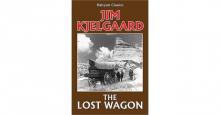 The Lost Wagon
The Lost Wagon The Spell of the White Sturgeon
The Spell of the White Sturgeon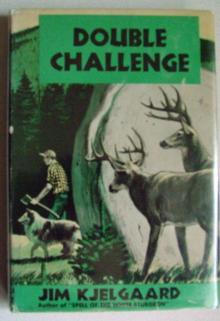 Double Challenge
Double Challenge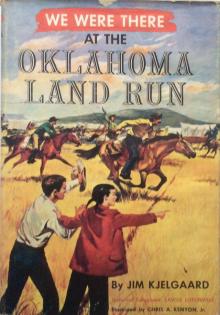 We Were There at the Oklahoma Land Run
We Were There at the Oklahoma Land Run Two Dogs and a Horse
Two Dogs and a Horse The Duck-footed Hound
The Duck-footed Hound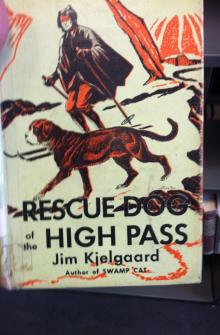 Rescue Dog of the High Pass
Rescue Dog of the High Pass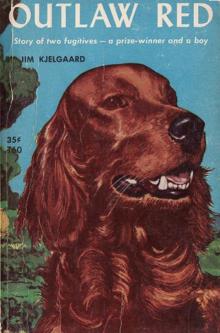 Outlaw Red
Outlaw Red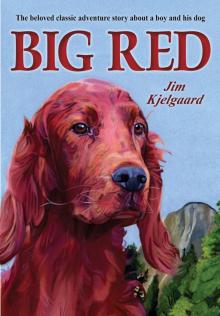 Big Red
Big Red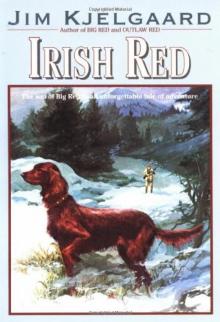 Irish Red
Irish Red